
When it comes to paying taxes, Canadians are used to footing the bill for income tax. But what about capital gains tax? When do you have to pay capital gains tax? This unique tax is applied to profits made from the sale of certain assets, such as stocks and real estate. While the rate of capital gains tax varies depending on the province in which you live, it is generally lower than your marginal income tax rate.
What Is Capital Gains Tax?
When you buy a property and later sell it for more than you paid, the difference is your “capital gain.” If the sale price is less than what you paid, the difference is a “capital loss.” Keep records of all improvements you make to the property so that you can add their cost to your “base cost” (what you paid plus the cost of these improvements), this will help to reduce your capital gain.
You pay tax on half your capital gain. So, if your capital gain is $50,000, for example, you include $25,000 in your income for tax purposes. The taxes you pay on a capital gain are usually lower than the taxes you pay on other types of income.
In order to calculate the capital gain, you must first determine the “taxable gain.” The taxable gain is equal to the sale price of the property minus the “adjusted cost base” of the property. The adjusted cost base is generally equal to the purchase price of the property, plus any improvements that have been made to the property, minus any depreciation that has been claimed.
If you are selling your principal residence (i.e. your home) and you lived in your home each year that you owned it, you will likely be eligible for a Capital Gains Tax exemption.

What Are Some Situation When You May Need To Pay Capital Gains Tax?
There are a number of situations where you may be required to pay capital gains tax in Canada. If you sell a property that is not your primary residence, you will typically be subject to capital gains tax. Similarly, if you sell shares of a company or other investments, you may also be required to pay capital gains tax. Capital gains tax is calculated based on the difference between the purchase price and the sale price of the asset. The rate of tax depends on a number of factors, including your marginal tax rate and the particular tax laws in the province which you own the property in. In some cases you may be able to make qualify for the principal home exemption. For example, if you sell your home and purchase a new one, you may be eligible for the exemption. However, there are restrictions and conditions that must be met in order for the exemption to apply.
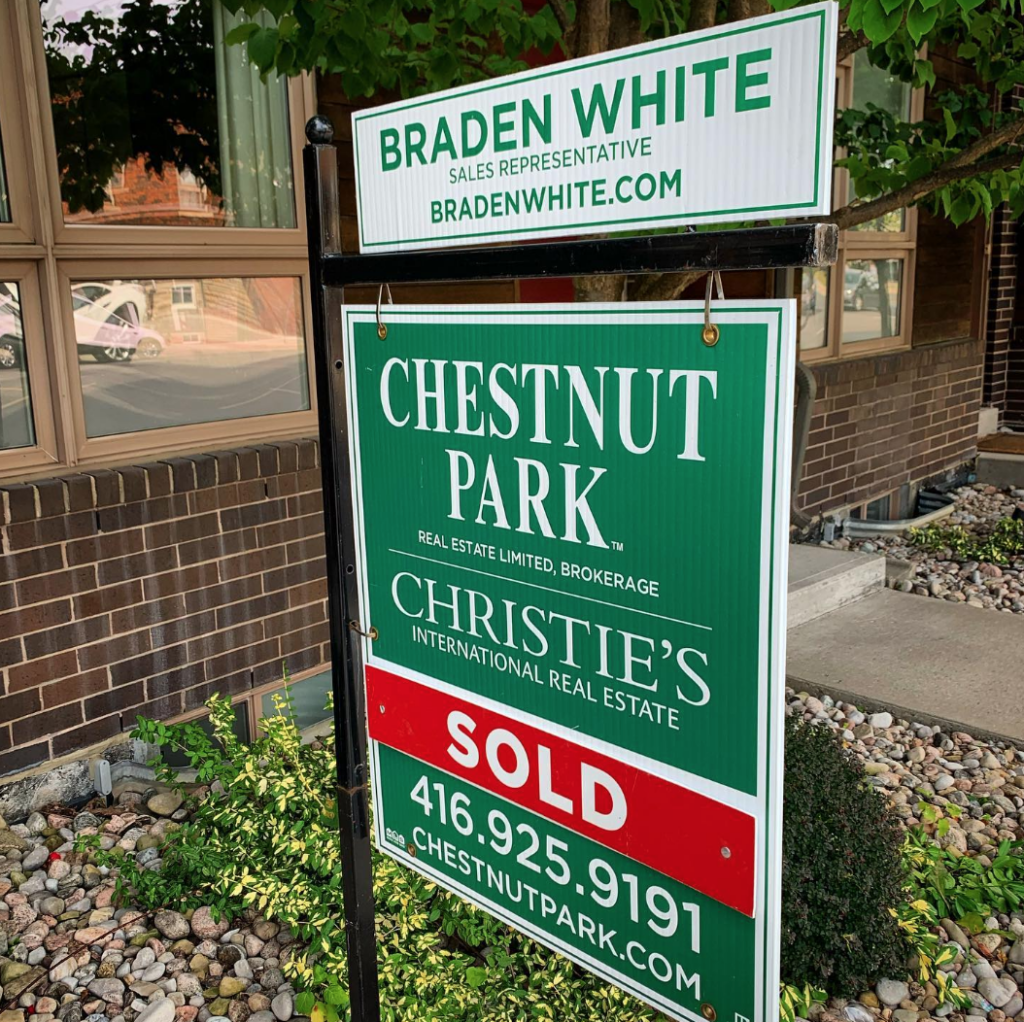
What Is A Principal Residence?
As of the time of this blog post, the Canadian Government states that the following criteria are required in order for a property to “qualify” as a principal residence:
As you can see from the above information, if you are considering investing in Toronto real estate, it is important to take capital gains tax into consideration when forecasting your return on investment. It is also important to keep in mind that you will likely be required to pay capital gains tax if you should decide to sell your principal residence and transition to renting a property. It’s important that you speak with your accountant or your real estate lawyer to see if you will be exempt from having to pay capital gains on the sale of your property.
Are you thinking of making a move or have questions about the Toronto real estate market? Contact me any time, I’m always happy to help.

As someone who lives in The Beaches and as an agent who works in the community, my clients often ask for suggestions regarding different restaurants in The Beaches, especially if they are new to the area.
One of the things I love the most about living and working in this part of the city is the fact that it doesn’t feel like you are in the city and it has the vibe of a small town even though it’s quite a large area geographically speaking. One of the best features this community has to offer are the many different restaurants that provide a wide range of food options to local residents and visitors.
I’ve put together this directory of Beaches restaurants in hopes of making your search for your next meal that much easier. Although this list may not include every single restaurant in The Beaches, it does include many of the prominent restaurants in the area. Feel free to send me a message if you think of a restaurant that isn’t on the list which you feel should be added.

Restaurants In The Beaches
The Beacher Cafe
2162 Queen Street E
Toronto, ON
416-699-3874
Slate Restaurant & Bar (Italian Food)
2237 Queen Street E
Toronto, ON
416-686-0800
Mamma’s Pizza (Italian Food / Pizza)
2118 Queen Street E
Toronto, ON
416-690-0707
6ix Pizzas (Italian Food / Pizza)
2070 Queens Street E
Toronto, ON
416-551-4894
The Hideout On The Beach (Pub Food)
2282 Queen Street E
Toronto, ON
416-693-2727
Bagels On Fire (Bagels)
2248 Queen Street E
Toronto, ON
647-343-8484
The Haven Low-Carb Cafe (Low-Carb, Gluten Free Food & Coffee)
2256 Queen Street E
Toronto, ON
416-698-2265
Remarkable Bean (Coffee Shop & Cafe)
2242 Queen Street E
Toronto, ON
416-690-2420
Oro Cafe & Eatery (Coffee Shop & Cafe)
2377 Queen Street East
Toronto, ON
416-690-6555
Tori’s Bakeshop (Coffee & Cafe)
2188 Queen Street E
Toronto, ON
647-350-6500
Bud’s Coffee (Coffee & Cafe)
1966 Queen Street E
Toronto, ON
416-699-9410
Sauvignon Bistro & Bakery (Coffee & Cafe)
1862 Queen Street E
Toronto, ON
416-686-1998
Juice & Java Cafe (Juices, Coffee & Cafe)
2102 Queen Street East
Toronto, ON
416-913-9977
Gong Cha (Bubble Tea)
1918a Queen Street E
Toronto, ON
416-686-1005
Starbucks (Coffee & Cafe)
1960 Queen Street E
Toronto, ON
416-690-0731
Tim Hortons (Coffee & Cafe)
2002 Queen Street E
Toronto, ON
416-694-8393
Zane Patisserie (Coffee & Cafe)
1842 Queen Street E
Toronto, ON
416-690-2813
Isabella’s Mochi Donut Boutique (Cafe / Japanese Style Donuts)
2066 Queen Street E
Toronto, ON
416-699-5050
Freshii (Healthy Food Options)
2032 Queen Street E
Toronto, ON
647-812-3601
Sunset Grill (Breakfast Food)
2006 Queen Street E
Toronto, ON
416-690-9985
Beaches Brewing Company (Beer & Pub Food)
1953 Queen Street E
Toronto, ON
647-492-3224
The Stone Lion (Pub Food)
1958 Queen Street E
Toronto, ON
416-690-1984
Breakwall BBQ & Smokehouse (Pub Food)
1910 Queen Street E
Toronto, ON
416-699-4000
The Gull And Firkin (Pub Food)
1943 Queen Street E
Toronto, ON
416-693-9337
Outrigger (Casual, American Food)
2232 Queen Street E
Toronto, ON
647-748-2232
Gabby’s (Pub Food)
2076 Queen Street E
Toronto, ON
416-699-5699
Ed’s Real Scoop (Ice Cream Shop)
2224 Queen Street E
Toronto, ON
416-699-6100
La Diperie Beaches (Ice Cream Shop)
2196 Queen Street E
Toronto, ON
416-567-3226
Xola (Mexican Food)
2222A Queen Street E
Toronto, ON
647-827-9070
Kyouka Ramen (Japanese Food)
222 Queen Street E
Toronto, ON
647-748-6288
Delhi Bistro (Indian Food)
2214 Queen Street E
Toronto, ON
647-351-6112
955 Chinese Food (Chinese Food)
2252 Queen Street E
Toronto, ON
647-354-3818
The Goof! Garden Gate Restaurant (Chinese & American Fare)
2379 Queen Street E
Toronto, ON
416-694-9696
Genji Sushi (Sushi)
2250 Queen Street E
Toronto, ON
416-699-9335
Yumei Sushi (Japanese Food)
2116 Queen Street E
Toronto, ON
416-698-7705
Hajime Japanese Restaurant (Japanese Food)
2209 Queen Street E
Toronto, ON
416-690-5959
Bikkuri Japanese (Japanese Food)
2197 Queen Street E
Toronto, ON
416-693-5775
Torisho (Japanese Food)
1940 Queen Street E
Toronto, ON
416-255-3584
Green Basil (Thai Food)
2120 Queen Street E
Toronto, ON
416-698-2120
Thai House Cuisine (Thai Food)
2213 Queen Street E
Toronto, ON
416-686-8541
Inmigrante (Latin Food)
1959 Queen Street E
Toronto, ON
647-628-8180
Swiss Chalet (Rotisserie Chicken)
2148 Queen Street E
Toronto, ON
416-693-2881
Subway (Sandwiches)
2229 Queen Street E
Toronto, ON
647-436-1105
The Souvlaki Hut (Greek Food)
2100 Queen Street E
Toronto, ON
416-690-1927
The Nutty Chocolatier (Chocolate & Sweets)
2179 Queen Street E
Toronto, ON
416-698-5548
Green Eggplant (Mediterranean Food)
2024 Queen Street E
Toronto, ON
416-913-3361
Delina Restaurant (Mediterranean Food)
1891 Queen Street E
Toronto, ON
647-348-2009
Toronto Beach Club (Mediterranean Food)
1681 Lake Shore Blvd E
Toronto, ON
416-694-8844
Friends Burgers (Burgers)
1922 Queen Street E
Toronto, ON
416-691-4545
Hero Burgers (Burgers)
2018 Queen Street E
Toronto, ON
647-748-7977
Fat Bastard Burrito (Burritos & Mexican Food)
2008 Queen Street E
Toronto, ON
416-551-3338
Tiflisi Restaurant (Georgian Food)
1970 Queen Street E
Toronto, ON
416-686-7389
Are you thinking about buying or selling in The Beaches or do you have questions about the market? Contact me any time with your questions or to discuss how I can help you achieve your specific real estate objectives.

If you’ve come across this blog post you’re likely either looking to hire “the best Toronto real estate agent”, you’re just curious to know who the best Toronto real estate agent is or you’re a real estate agent checking to see if Google has you listed as “the best Toronto real estate agent”. Regardless of reason, you’ve ended up here.
So, who is the best Toronto real estate agent?
That’s a great question and although many people will throw around certain “luxury agent” names during conversations, it’s hard to specifically define what “The best Toronto real estate agent” means or who they are. Are we talking about an agent who sells the highest volume of properties each year, an agent who sells very few properties but the ones they do sell are in the multi-million dollar price range, an agent who sells few properties but each one they list sells for record breaking numbers, are we talking about the agent that provides their clients with the absolute best level of service each and every time no matter what the price point is, is it the most honest agent, the one with the highest education, the one who is a part of elite social circles, the one with the most brokerage awards, the most Instagram followers or the most Google reviews?
“The best Toronto real estate agent” is quite a subjective term that will mean something different to everyone depending on what they value and what they are looking for in an agent.
As a full-time Toronto real estate agent who works with both sellers and buyers, I have had my fair share of experiences with working along side and opposite of agents on the other side of the deal table. I’ve had the opportunity to work with and opposite of “high end”, “low end”, experienced, new agents and everything in between, and what I have learned over the years is that Toronto real estate agents come in all different shapes and sizes, with different skills, backgrounds and personalities. Some are good and some are not so good, just like any other industry.
There are many great agents out there and when it comes to selecting the “best Toronto real estate agent” for your specific real estate objectives, it’s important to consider your specific needs and expectations. It’s essential that you consider what is important to you, what do you need from an agent to succeed at achieving your specific real estate goals. The agent who sells multi-million dollar homes may not be the right one for you if your home’s value is closer to the average Toronto home price. Conversely, if you’re looking to sell your $15M home in the Bridle Path, an agent who specializes in selling condos for $500k is probably not the one for you either. These are just a couple of examples as to why the Google results for “the best Toronto real estate agent” may not be the right ones for you to make your decision, depending on what you specifically need and value.
Your search inquiry to Google shouldn’t be “who is the best Toronto real estate agent?” when looking to hire a real estate agent, the right question you should be asking yourself is “who is the best Toronto real estate agent for me?”. Who is going to provide you with the best results, the best customer service based on your home type, budget and specific needs and expectations. Who will you relate to the most and and enjoy working with and who will empower you as a seller or buyer by providing you with valuable information before, during and after the buying or selling process. Do you want to work with a real estate team and potentially get passed around amongst the team’s junior and less experienced agents or do you prefer to work with an experienced individual agent who will provide you with more one on one and personalized service. These are just some of the things you should be taking into consideration.
Whether it’s real estate, sports, fashion or otherwise, many people want to be associated with whomever is currently perceived as number one, but in real estate, the reality is that the perceived best Toronto real estate agent may not be the right one for you and your specific needs and values will determine who is actually the best fit for you and your real estate objectives.
Are you thinking about buying or selling or do you have questions about the current market? Contact me any time. I’m always happy to help.

Whether you are looking to buy a home or sell your home in Toronto, you may have wondered “what is a 3D virtual tour?”. Although this technology isn’t new, it has become extremely popular over the last several years due to the pandemic restrictions that took place. The industry leader responsible for providing this technology is Matterport.
What Is A 3D Virtual Tour
Matterport has created a web-based platform that allows users to create 3D virtual twins of any space with the use of their 3D cameras. Once the photos have been taken, the system then creates a 3D twin of the space which viewers can then walk through virtually by toggling throughout the space. Below is a short video explanation with some examples.
When it comes to buying or selling a home, there are a lot of important decisions that need to be made. One of the most crucial decisions is whether or not you should rely on a virtual home tour for either buying a home or selling your home. Below are some things you should consider before making your decision.
The Advantages Of Virtual Home Tours
The Disadvantages Of Virtual Home Tours
Overall, 3D virtual home tours are a great option for anyone who is buying or selling a home. They are convenient, offer a realistic view of the property, and can be edited to your liking. Just keep in mind that they may not be as reliable or informative as in-person tours. For that reason, when buying, I’m a firm believer that you should always view the property in person.
Hopefully the above has answered any questions you may have about what a 3D virtual tour is.
Are you thinking about making a move or have questions about the current market? Contact me any time, I’m always happy to help.

Divorce and selling your home can be two very emotional and overwhelming experiences, but with the right help, you can avoid costly mistakes in order to make the process as stress-free as possible. As a Toronto real estate agent who has assisted clients with selling their homes due to divorce, I understand how stressful the process can be for everyone involved. I have put together this article to help answer any questions you may have about the process of selling your home due to divorce.
In this article, we’ll summarize what qualifies as a matrimonial home, the rights relating to the matrimonial home for each spouse during separation, the process of selling a house in Toronto along with guidance on how to make the sale as smooth and successful as possible.
What Is A Matrimonial Home?
It’s important to understand what defines a matrimonial home here in Toronto.
Section 18(1) of the Family Law Act defines a matrimonial home as any property which either spouse has an interest and is currently, or was at the time of separation, ordinarily occupied by the person and his or her spouse as their family residence.
There are no restrictions in regards to what type of property qualifies as a matrimonial home here in Toronto and throughout Ontario. Whether it is a condo in the city, a cottage in cottage country or a mobile home, there are no restrictions so long as the property is owned by one or both spouses and the property is “ordinarily occupied” by the spouses at the time of separation.
A common misconception relating to the matrimonial home is that there can only be one matrimonial home which is incorrect. In Ontario, spouses can have more than one matrimonial home. Make sure you speak to a reputable real estate lawyer to understand the designation of each property you own prior to listing any of your properties for sale.

Your Rights
There are three options when it comes to the what can be done with the matrimonial home during a divorce:
The second and third option would likely require the opinion of both an appraiser and a reputable real estate agent in order to determine what would be fair market value for the home. However, it is important to understand the risks associated with this option. The best way to determine a properties true market value is always by listing it on the open market as buyers will ultimately decide how much your home is worth. Additionally, depending on the market at the time that you list, there is always the potential for a bidding war which could substantially increase the final sale price of the home. This is just something to consider and to discuss with a real estate agent prior to agreeing buy out your spouse.
Your rights during the separation process:
It’s important that you speak with a lawyer who specializes in family law and who knows the Family Law Act to understand all of your rights, before, during and after the separation.

Selling Your Home
When selling your home due to divorce, it is crucial that both spouses work together as much as possible in order to achieve the best possible price for the home. It is in the best interest of both spouses to work together during this time as both will be splitting any profit derived from the sale of the property. Below is a list of just some of the items and situations where both parties will need to come to an agreement before and during the listing process.
It is also important to take into consideration all of the costs associated with selling your matrimonial home when forecasting any potential split of equity from the sale. Below is a list of the larger costs to consider.
Divorce and selling your home can be an incredibly difficult and emotional time, but it doesn’t have to cause too much disruption in your life. Selling a house in Toronto due to divorce may seem like an overwhelming task, but if you take the right steps, you can make the process as stress-free as possible. Speak with a family lawyer, take the time to go over your finances and consider getting help from a local reputable real estate agent. By taking these steps and understanding the process of selling a home due to divorce, you can ensure that you are making the best decision for both parties involved.
Do you have questions about selling, buying or about the market in general or do you need a referral to a family lawyer? Contact me any time with your questions or to discuss how I can help you achieve your specific real estate objectives.


If you’ve been considering selling your home and have completed some preliminary research as to what the process is, you may have come across the term “virtual staging” and wondered “What is virtual staging?”. I have put together this blog post in order to help you understand what virtual stating is along with the pros and cons of this staging method so you can decide if it is right for your home.
When selling or leasing a home, it’s important to make sure that it looks as appealing as possible to potential buyers or tenants. One way to do this is by using virtual staging. Virtual staging is the process of adding or removing furniture and other objects from an image in order to create a more appealing visual. This can be done for photos of individual rooms or for entire home, both inside and outside.
If you’re thinking about virtually staging your home for sale, there are a few things to keep in mind. First, you’ll want to make sure that the furniture you use is in line with the overall style of the home. Second, you’ll want to choose pieces that are neutral in colour and design. This will help potential buyers or tenants visualize themselves living in the space. Finally, you’ll want to make sure that the furniture is arranged in a way that makes sense for the room.
Below are the pros and cons of virtual staging.
Pros:
Cons:
In order to help you visualize what virtual staging is, I have included some before and after photos below of a space that my team of stagers and I recently virtually staged for landlord clients of mine for their investment property. As you will be able to see from the photos, the virtually staged photos provide a sense of how the space can look with furniture. The best part about this process is that it simply involves taking professional photos and my virtual stager’s time to put everything together using their virtual staging software.
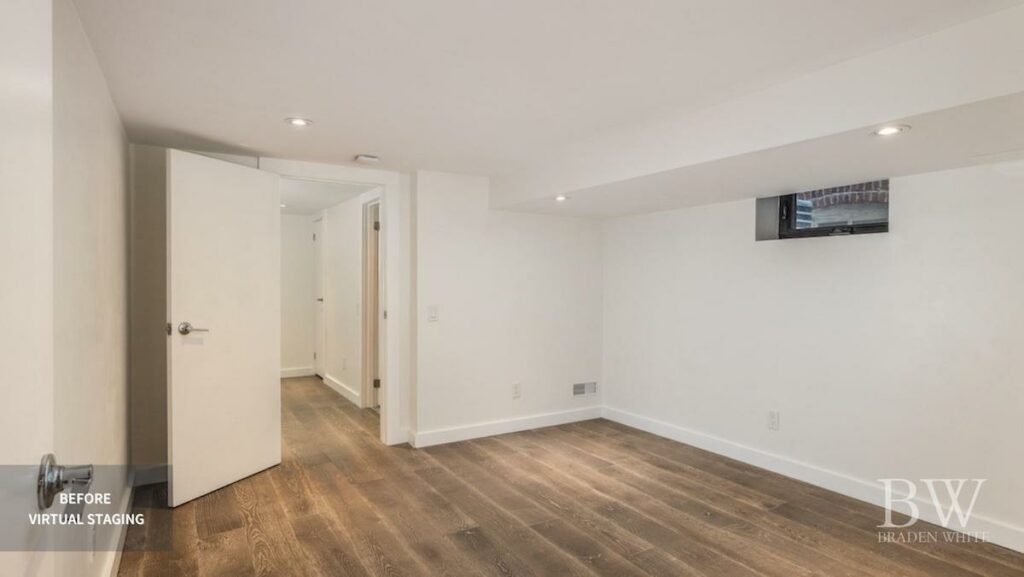
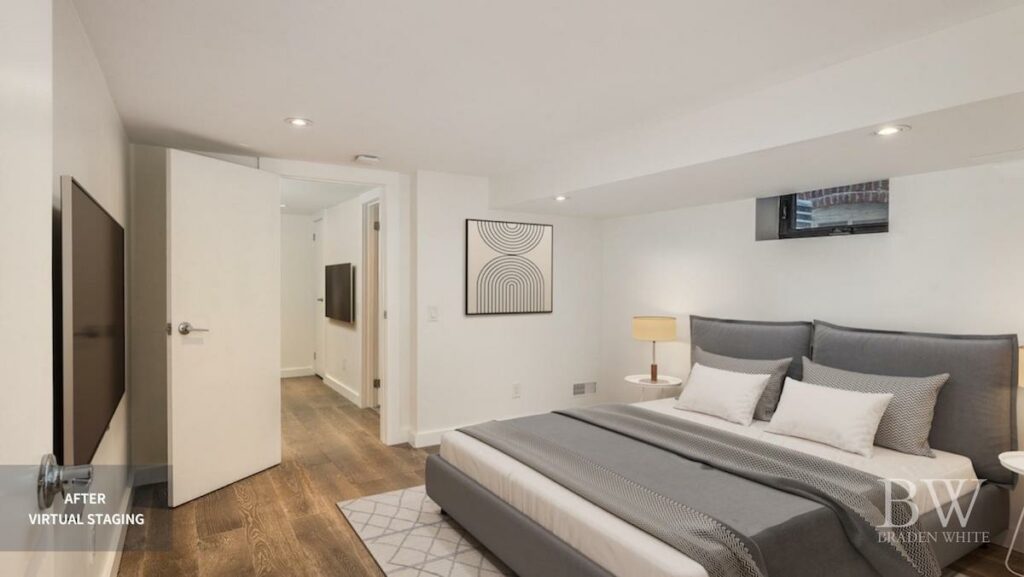
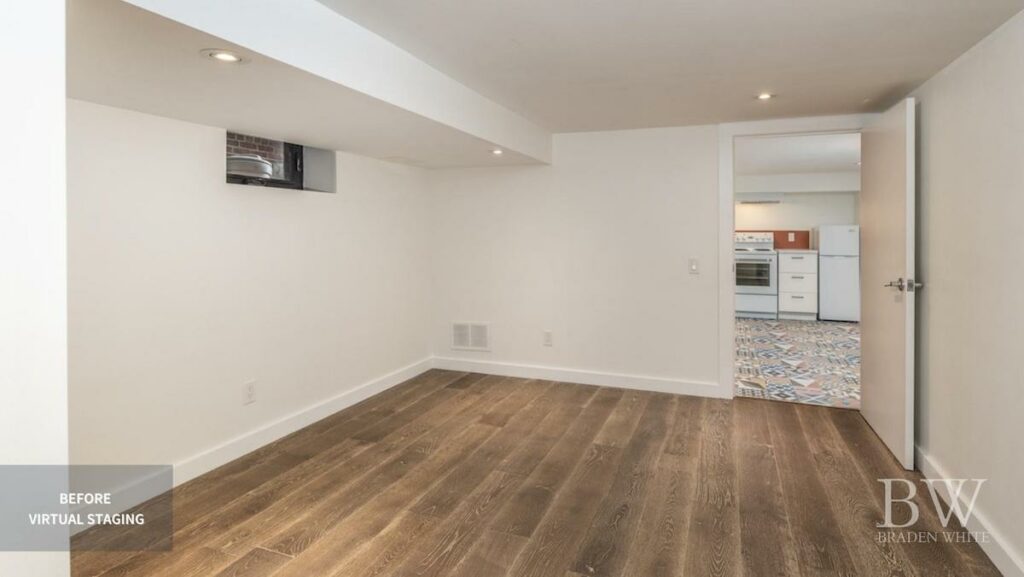
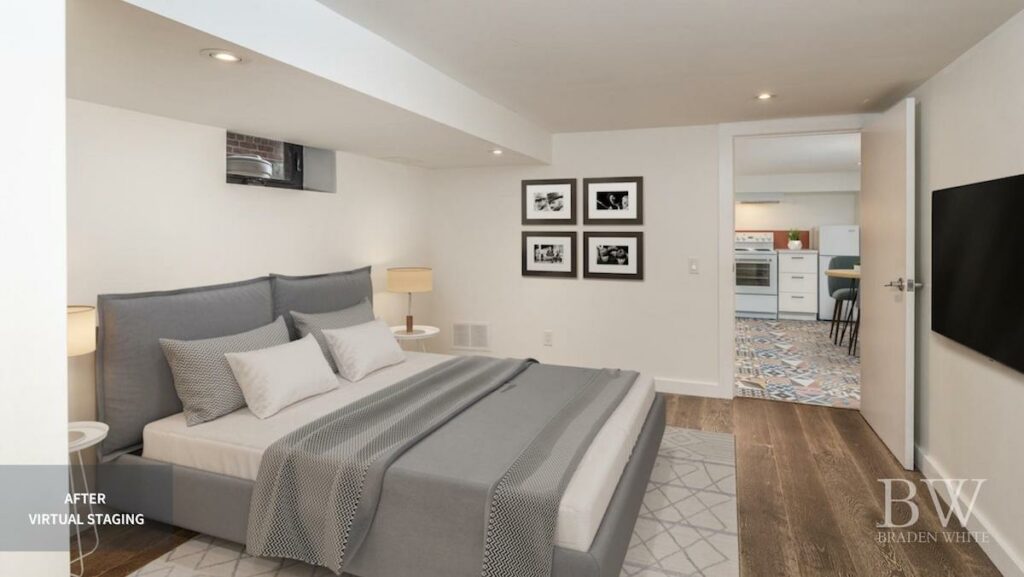
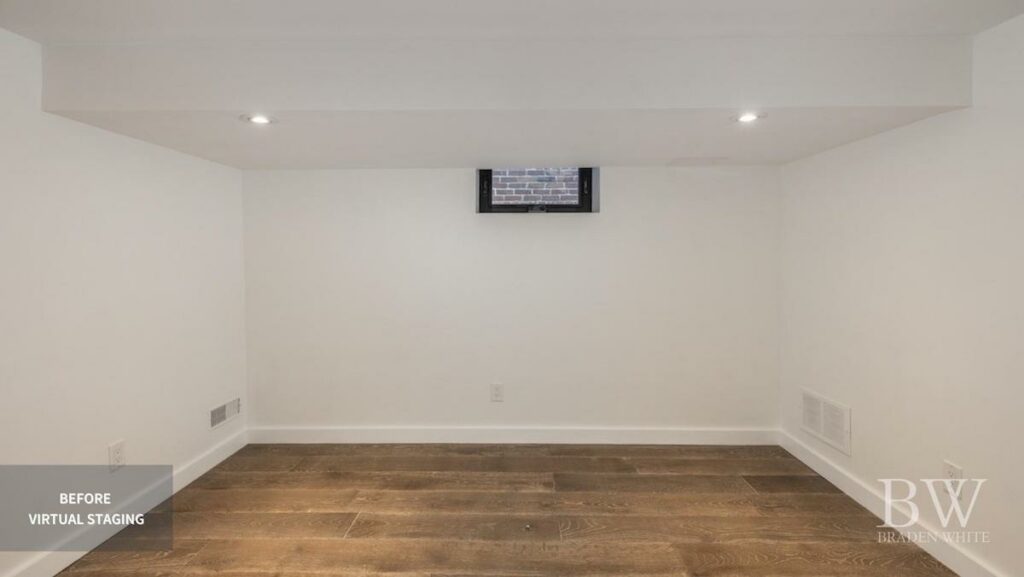

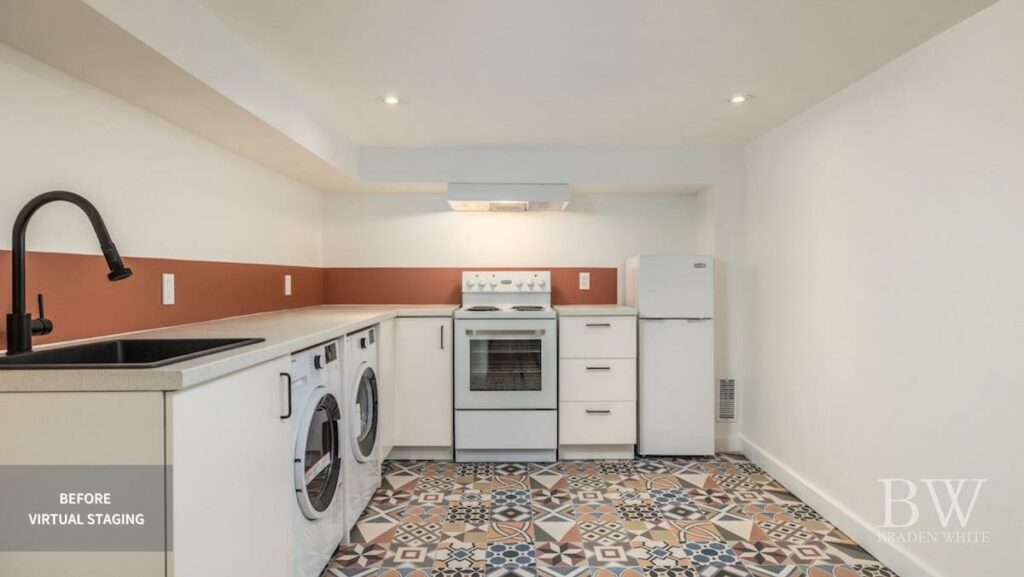
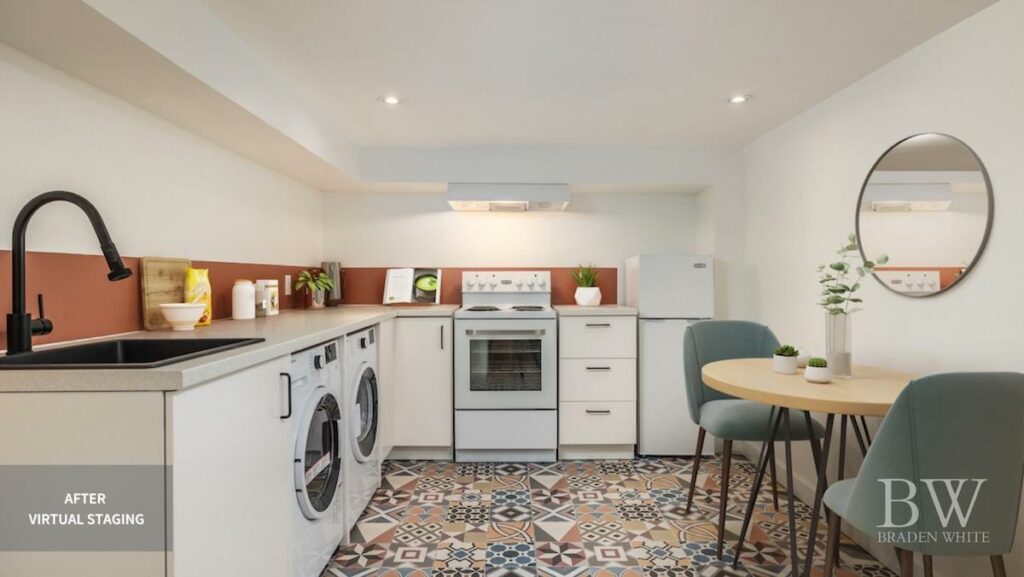
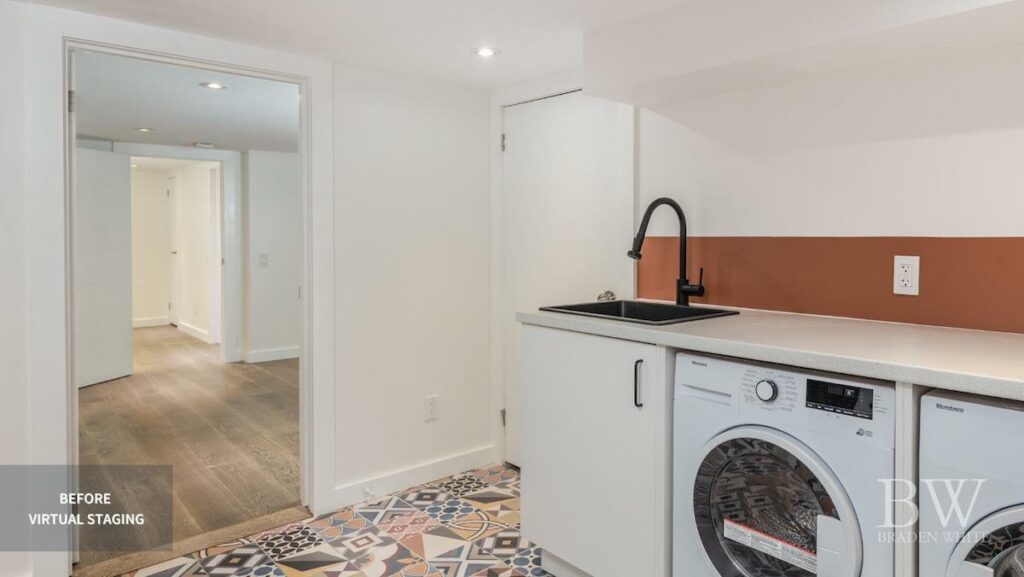
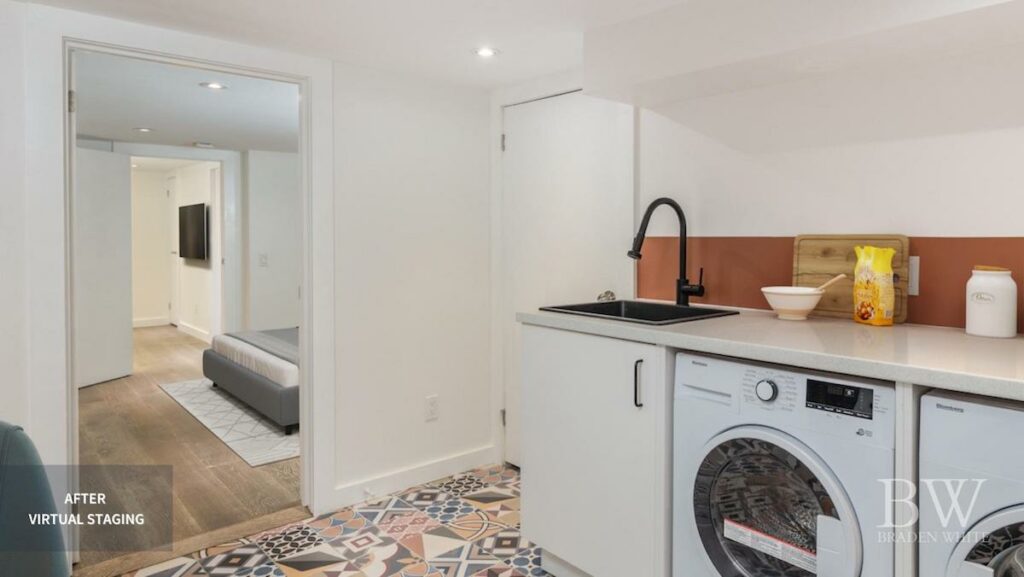
Below are additional photos of another space that my team and I virtually staged for a client.
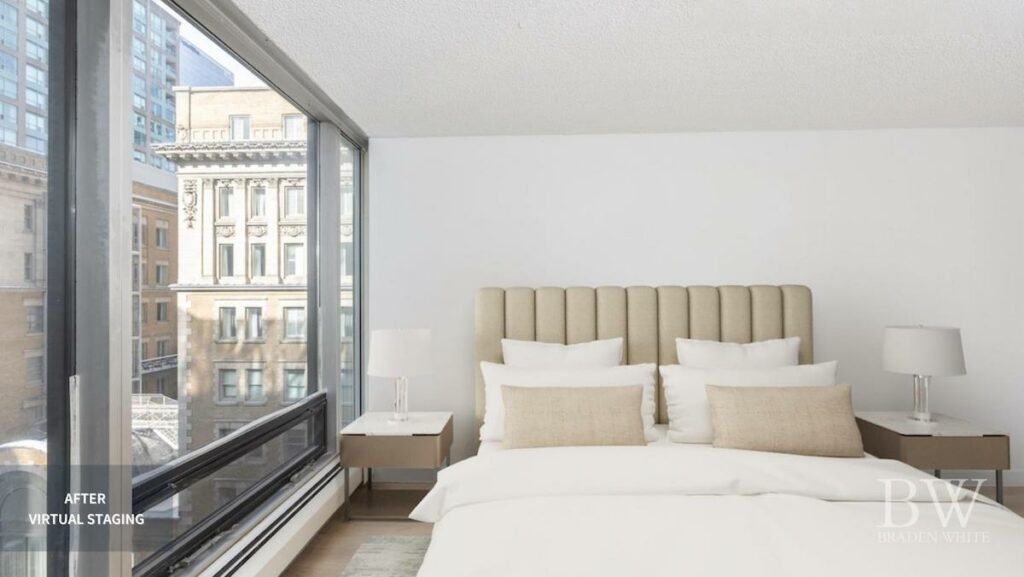
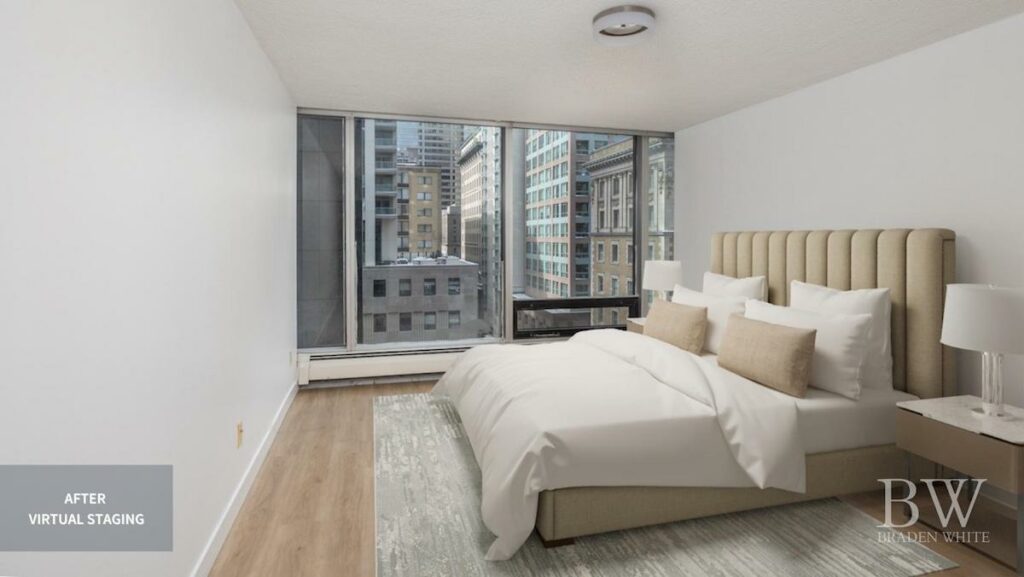

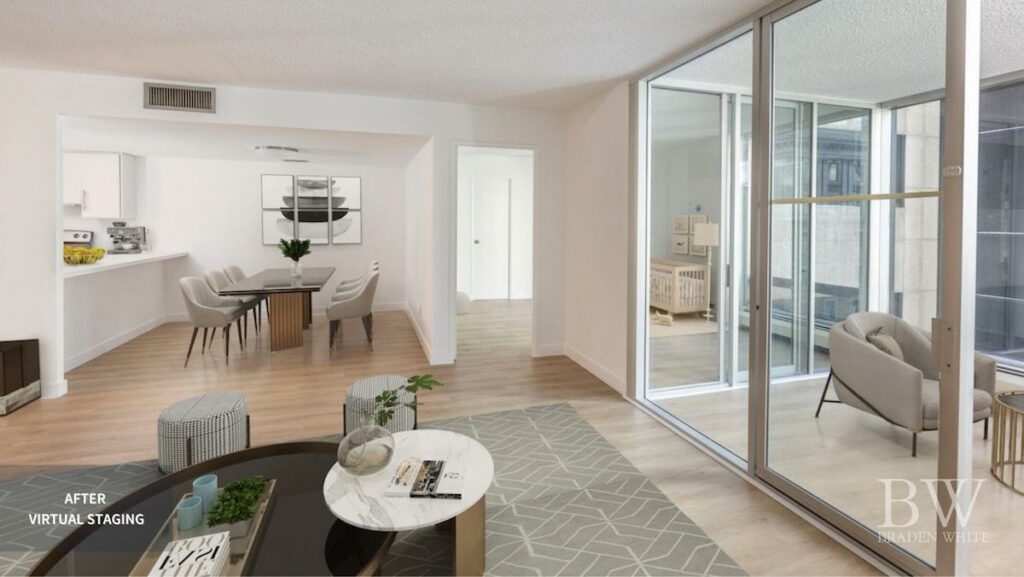

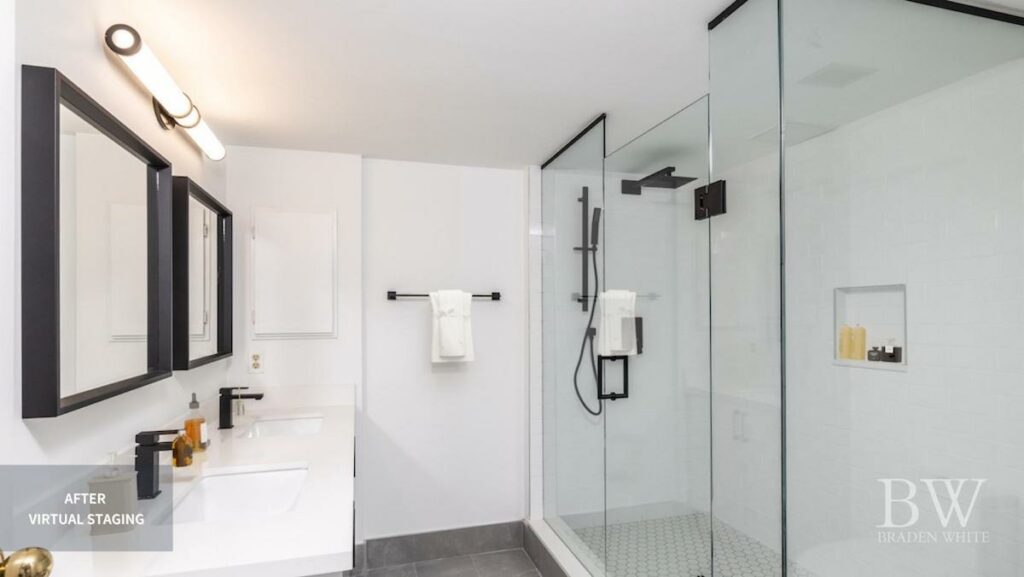

If you’re working with an experienced real estate agent who is up to date with current staging and marketing trends, they will likely be familiar with virtual staging and they should be able to explain if it’s right for your home. Either way, virtual staging is a great way to make your home more appealing to potential buyers and tenants.
Hopefully the above information was able to answer any questions you may have had about virtual staging.
Are you thinking about making a move or do you have a property that you are thinking of selling or leasing? Contact me any time with any questions you may have about the current market and how I can help you achieve your specific real estate objectives.

Understanding how to choose the right contractor can be a daunting task. You want to make sure you get the best value for your money, and that the job is done correctly.
Before starting my career in real estate, I owned a design and build company that specialized in a wide range of projects. Whether it was installing custom pools and landscaping or providing project management services for interior renovation projects in some of Toronto’s most affluent neighbourhoods, I helped many clients with turning their renovation dreams into reality. With over 15 years in the design and build industry and interviewing and hiring sub-contractors for many projects, I’ve seen it all and know what to consider and look out for when hiring a contractor.
Below are seven tips to help you choose the right contractor in Toronto for your project.

#1: Ask For Referrals From Friends, Family And Neighbours
The best way to find a good service provider is through referrals from people you know and trust. Friends, family, and neighbours are all likely to have had work done on their homes at some point, so they can give you first-hand insights into the quality of workmanship and customer service you can expect. When speaking with people who have had similar work done, ask about their overall experience and whether they would recommend the same company to others. Once you have a few referral names, take the time to do your own research by reading online reviews and checking out the company’s website. This will help you make an informed decision about which service provider is right for you.
#2 Check The Contractor’s License & Insurance
Before hiring a contractor, be sure to check their license and insurance information. This will help to ensure that they are properly qualified to do the work and that they have the financial resources to cover any damages that may occur. To check a contractor’s license, contact your local City of Toronto building department. For insurance information, ask the contractor for a certificate of insurance or contact their insurer directly. You will also want to ask for proof of WSIB. By taking these precautions, you can help to protect yourself from costly mistakes and avoid potential legal issues.

#3 Get Estimates From Several Contractors
Before you begin any home improvement project, it is important to get estimates from several contractors. This will give you a better sense of the overall cost of the project and allow you to compare prices. It is also important to ask each contractor for a list of references. This will give you an opportunity to speak with past clients and get a better sense of the contractor’s workmanship. Once you have gathered estimates and spoken with references, you will be in a better position to choose the right contractor for your project.
#4. Review The Contractor’s Work And Reviews
Before you decide on which contractor to use, meet with each contractor in person and see if you can view some of their completed work in person. This will give you a chance to ask questions and get a feel for the quality of work they provide.

#5: Make Sure The Contractor You Choose Is Clear And Concise:
A construction project can be an overwhelming task, no matter how big or small it may be. There are many factors to consider, and the last thing you want is to end up with a contractor who is not up to the job. When choosing a contractor, make sure that they are clear and concise in their communication. They should be able to explain the scope of the project and give you a realistic timeline for completion. In addition, they should be able to provide you with a detailed estimate of the costs involved. By taking the time to find a contractor who meets these criteria, you can ensure that your construction project will be completed on time and on budget.
#6 Make Sure Your Contractor Gets The Necessary Permits Before Starting The Work
Before beginning any construction project, it is essential to obtain the proper permits from your local government. Building without a permit can result in expensive fines, and in some cases, your work may need to be torn down. The permitting process can seem nerve-racking, but it is relatively straightforward if you know what to expect. In most cases, you will need to submit a set of plans to your local building department, along with a fee. Once your plans are reviewed and approved, you will be issued a permit. Make sure to check with your local building department for specific requirements in your area. Taking the time to obtain the necessary permits will help ensure that your construction project proceeds smoothly. You can begin your building permit application HERE.
In addition to avoiding delays and potential fines, obtaining the necessary permits also ensures that you do not run into any issues when selling your home. Not obtaining the necessary permits can be a costly mistake when it comes time to list your home for sale. Discover the 5 reasons why you should get a building permit HERE.
#7 Read The Contract In Detail:
Finally, be sure to review the contract carefully before signing it (including any fine print). This will help you avoid any misunderstandings or unexpected costs down the road.
By taking the above precautions, you can be sure that you’re hiring a reputable contractor who will hopefully do a great job and provide you with good service.
Are you thinking about making a move and have question about the current market or what renovation projects will add the most value to your home? Contact me any time with your questions or to book a free consultation to learn what renovations will add the most value to your home.

In September 5,038 residential properties were reported sold in the greater Toronto area. This is the lowest number of recorded sales for September since 2001 when only 5,021 properties were sold. This data is even more dramatic and the decline is more striking when correlated to the greater Toronto area’s population. In 2001 Toronto’s population was almost 4.7 million people. Currently, it is approaching 6.4 million.
There is no mystery as to why sales have decreased so dramatically. In March of this year 10,871 properties were reported sold. This was not a monthly record. The record for monthly sales is March 2021, when 15,627 sales were recorded. The decline in sales can be directly attributed to the rise in the Bank of Canada’s benchmark rate. In early March it was 0.25 percent. It’s now 3.25 percent and expected to rise once again by the end of October when the Bank provides its analysis of the economy and its views on inflation.
The basic market data for September is set out in the chart below.
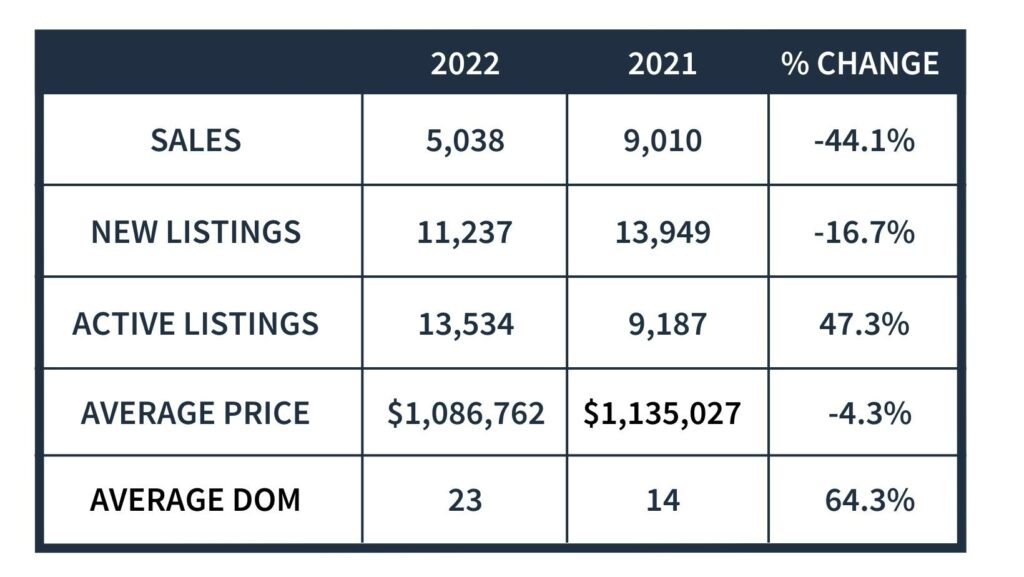
As mortgage interest rates have continued to increase, more than double since March, sales and average sales prices have declined. Current 5 year fixed mortgage interest rates hover around 5.5 percent. Potential buyers however must qualify at 7.5 percent when mortgage stress testing is applied. The increase in mortgage interest rates have effectively made housing even less affordable than it was in February of this year when the average sale price for all properties sold in the greater Toronto area was $1,334,093, almost 20 percent higher than it is today.
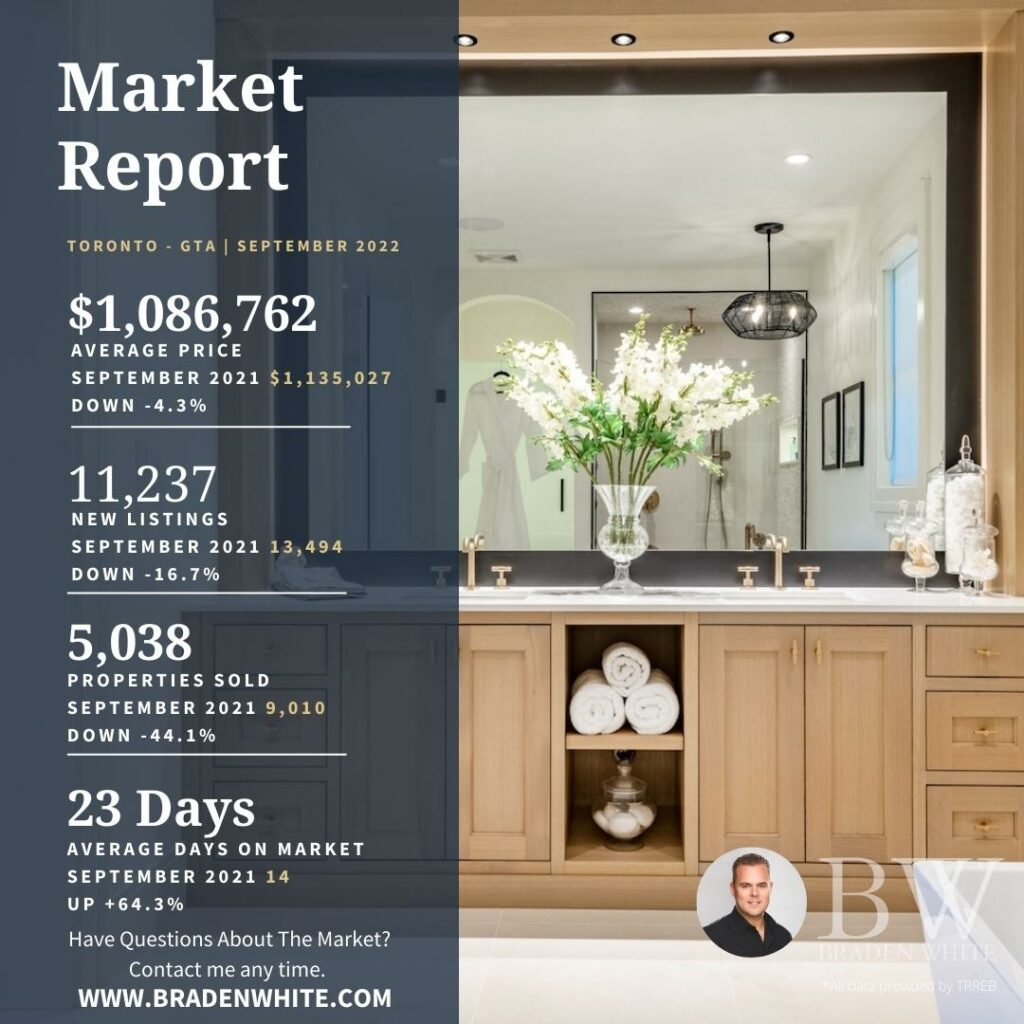
The decline in average sale prices is, except for condominium apartment sales, universal. Both in the City of Toronto and in the 905 region, prices for detached, semi-detached, and townhomes decreased on a year-over-year basis. Condominium apartment sales prices, the least expensive housing in the greater Toronto area, increased by 3.4 percent in the City of Toronto and by 3.3 percent in the 905 region. In central Toronto, where most of the greater Toronto area’s condominium apartments are located, the average sale price came in at $827,478. Notwithstanding the overall decline in average sale prices over the last six months, the least expensive housing form in the greater Toronto area has not become less expensive.
Sales prices are now consistently lower than asking prices. That’s because buyers have more choices and multiple offer competitions are the exception and not the norm as they were during the height of the pandemic. In September the average sale price compared to the average list price was 98 percent. In February and March, all properties sold (on average) for more than 110 percent of the asking price.
The only trading area that is bucking this trend is, once again, Toronto’s eastern districts. In September, all properties reported sold in Toronto’s eastern districts sold for 101 percent of their asking price and in only 19 days. Semi-detached properties sold for 104 percent of their asking price and in only 13 days. Multiple offer competitions are not unusual in the eastern districts, especially Riverdale, Leslieville, and the Beach, although they are nowhere near as frequent as they were prior to March of this year.
Unfortunately, there are no signs of relief for the rest of the resale housing market in the near future, although it does appear that average sale prices have stabilized and have even risen since July. At the beginning of September average sale prices in the City of Toronto were slightly over $1 Million. At the end of September, they were hovering around $1,080,000. Based on public statements made by the Bank of Canada in its crusade to reduce inflation, a further increase in the benchmark rate is expected in late October. The consistently increasing rates have had a negative financial and psychological impact on buyers. Consequently, we can expect a continuation of September’s market trend right through to the end of 2022.
Have questions about the market, selling or buying?
Contact me any time. I’m happy to answer any questions you may have.
Prepared by Chris Kapches, LLB, President and CEO, Broker, Chestnut Park® Real Estate Limited, Brokerage.

The mornings are brisk, the leaves have started changing to beautiful vibrant colours and we begin to see our breath. It’s hard to believe but it’s that time of year again, the time to look over your fall home maintenance checklist. Below is a list of items you will want to consider addressing this fall before the temperature gets too cold. Not only are the items in this list below important for general home maintenance, they are also important to consider if you have any plans of selling your home in the near future as ignoring them could reduce the value of your home.
Clean And Pack Away All Af Your Patio Furniture Cushions – Before the temperatures get too cold, spray down your patio furniture cushions and let them dry out in the sun before storing them for the winter. If you wait too late into the fall or early winter to do this, your cushions won’t dry.
Store Or Wrap Your Outdoor Furniture – If you don’t have any indoor space to store your outdoor furniture, consider wrapping your furniture in order to protect it from the ice and snow. This is especially important for any metal furniture as the moisture from the ice and snow will potentially cause it to rust.
Deadhead And Prune Your Gardens – It is best to deadhead and cut back and prune the plants and trees in your garden that require this type of care in the fall. Don’t forget to check your local garbage schedule HERE to see which days collect compostable garden waste bags.

Aerate, Overseed & Fertilize Your Lawns – Aerating, overseeding and fertilizing your lawn in the fall will help it look its best in the spring. This is very easy to do on your own if you are comfortable with using simple hand tools. You can also hire a company to provide this service.
Clean Your Eavestroughs & Downspouts – This is extremely important as you don’t want to experience any water or ice damage during the winter months due to clogged eavestroughs and downspouts. You may want to try contacting Sunnyside Window & Eaves Cleaning if you live in the east end of the city such as The Beaches, Upper Beaches, Birchcliff, East York, Danforth Village, Leslieville or Riverdale.
Test Your Sump Pump – If you have a sump pump, it is important that you test it before the winter to ensure that everything is running properly in order to avoid basement flooding which can happen when snow thaws during the winter months and in the early spring. If you don’t already have one, you may want to consider installing one as the cost of installing a sump pump definitely outweighs the costs and inconvenience that comes along with a potential flood in your basement. In addition to having a sump pump, it is best to also have a back-up battery connected to it so that your sump pump is always ready to do its job even if your power goes out.

Get A Check Up On Your Heating System – This may be too obvious to have on a fall home maintenance checklist, but I’ve included it just in case you haven’t thought of it. With the freezing cold winter months coming, the last thing you want is for your heating system to break down. Hire an HVAC company in the fall to complete a check up on your system to ensure that everything is in good working order.
Cover Your Air Conditioner – Cover your air conditioner with a waterproof cover to avoid any ice getting into it and damaging it. This will also keep out other unwanted items like leaves, twigs and branches which could potentially damage your air conditioner.
Change Your Furnace Filter – Since you are going to be spending more time inside over the winter months, it’s essential that you are breathing clean air. Many people forget to change their furnace filter on a regular basis which can not only lead to an unhealthy living environment but also potentially cause damage to your heating system which is very expensive to replace. It’s recommended that you change your air filter every 90 days. In addition to changing your air filter, you may also want to consider upgrading your air filter to a higher grade.
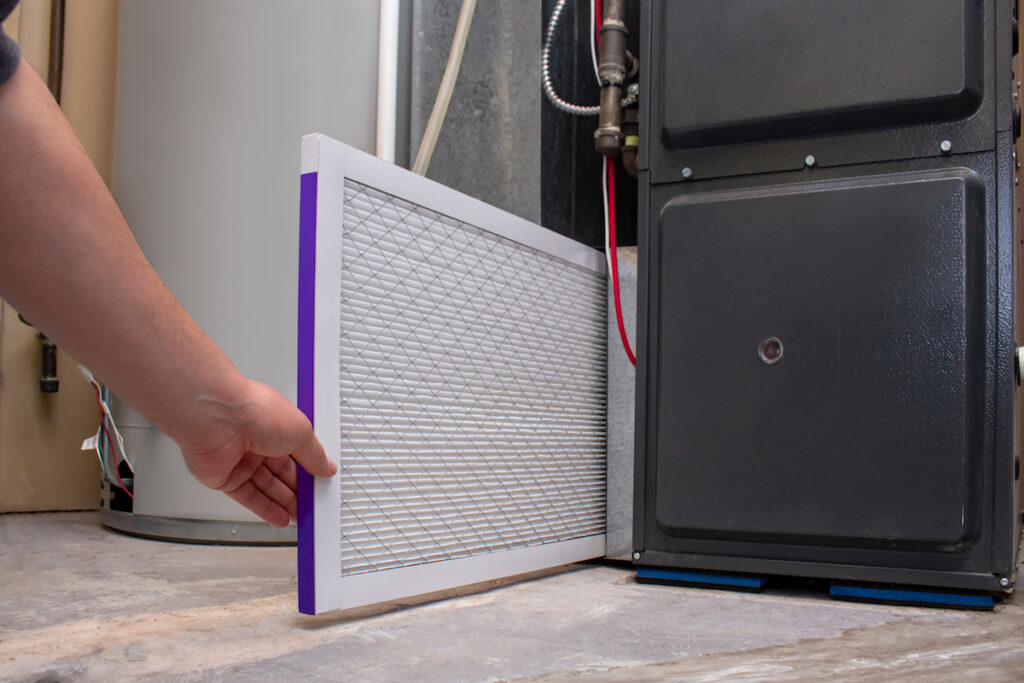
Check Your Fire And Carbon Monoxide Alarms – With the use of fireplaces and other heating systems during the winter months, it’s important to test your fire and carbon monoxide alarms and to have any glitches addressed immediately. If you have independent alarms that run on batteries, make sure you switch out the batteries with new ones in the fall to ensure that they work if needed.
Get A Checkup On Your Fireplace – Whether you have a gas fireplace or a wood burning fireplace, it is important to ensure both are in good working order and are safe to use this fall and coming winter. If you have a wood burning fireplace, it is important that you use a WETT certified inspector to inspect your chimney and fireplace. Most gas fireplace companies have their own inspectors that will inspect your fireplace to ensure that it is safe to use.
Clean Your Windows – Fall is a great time to clean your windows before it gets too cold in the winter. You may want to try contacting Sunnyside Window & Eaves Cleaning if you live in the east end of the city such as The Beaches, Upper Beaches, Birchcliff, East York, Danforth Village, Leslieville or Riverdale.

Declutter Your Summer Items – Many homes in the east end of the city such as The Beaches, Upper Beaches, East York and Leslieville are quite small and don’t have front hall closets. Fall is a good time to move your summer belongings into storage.
Turn Off Your Outdoor Hose Bibs – This is an important one to include in your home maintenance checklist. It is extremely important that you either turn off all of your outdoor hose bibs or replace them with non-freeze hose bibs in order to avoid any flooding due to freezing pipes.
Drain garden hoses – Drain any garden hoses you may have and store them indoors. If you leave water in your hose, it can freeze and expand to the point that it damages your hose.

Blow out irrigation pipes – This is a very important step if you have an irrigation system. If you neglect to do this, you could be looking at costly repairs to your irrigation system.
Prepare Gas Operated Equipment For The Winter Storage – Remove any remaining fuel or add fuel stabilizer to any gas powered equipment. This will ensure that your equipment will start properly in the spring and keep your equipment in good working order.
Test And Tune Up Your Snowblower If You Have One – Don’t wait until the biggest snowfall of the year to test your snowblower. Make sure everything is running properly before the first snowfall to avoid any issues.
Although it may seem like a lot to tackle, most of these items are essential to address prior to the winter months. What seems like a bit of a hassle now will definitely pay off over the winter. Save this list as your fall home maintenance checklist for years to come.
Are you thinking about making a move or have questions about the current market or buying and selling processes? Contact me any time with your questions, I’m always happy to help.